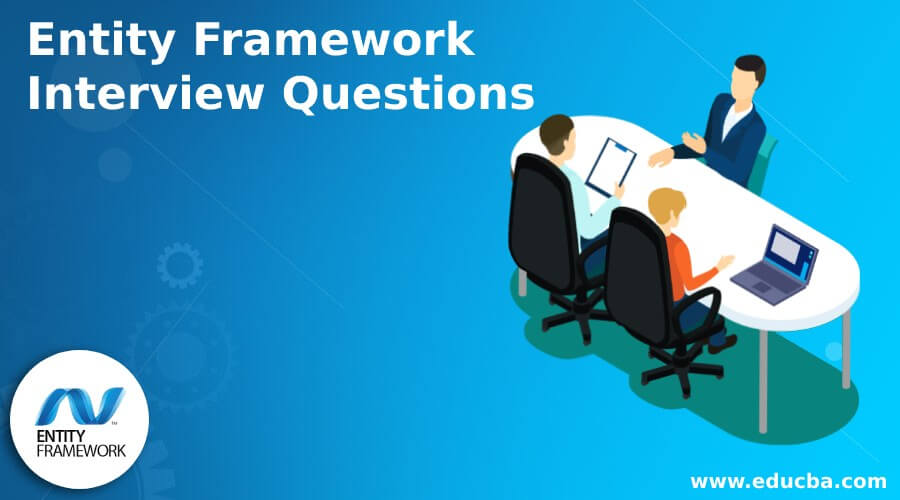Updated April 4, 2023
Introduction to Entity Framework
Entity framework is an open-source ORM (Object Relational Mapping) framework for ADO.Net. It is a set of technologies in ADO.Net which supports the development of data-oriented software applications. It allows a software developer to work with .Net applications and other domain-specific objects. Furthermore, it helps in streamline mapping between different objects within the software by providing tables and columns. If you are looking for a job related to the entity framework, you need to prepare for the interview with questions and answers.
In this 2023 Entity Framework Questions article, we shall present the 10 most important and frequently asked Entity Framework Questions. These interview questions are divided into two parts are as follows:
Part 1 – Entity Framework Interview Questions (Basic)
This first part covers basic interview questions and answers:
Q1. What is ADO.Net EF?
Answer:
ADO.Net EF stands for ADO.Net entity framework, is an ORM framework which allows users to work with various databases like SQL Server, Oracle, DB2, MySQL, etc. ADO.Net EF is also used to create senior abstract object model on top of ADO.Net components. It enables users to use advanced level domain objects like customers, suppliers, etc.
Q2. How does the entity framework is differ from ADO.Net?
Answer:
The entity framework is slow as compared to ADO.Net. ADO.Net create data layer code while entity framework cannot create data layer codes. The entity frame has the ability to create code for the intermediate layer, data access layer and mapping codes where ADO.Net cannot create the code for the intermediate layer, data access layer and mapping codes. With an entity framework, a web developer can cut down the development of work and time.
Q3. List and explain the components of the entity framework.
Answer:
There are 6 components of entity framework EDM, Entity SQL, L2E, Entity client data provider, Net data provider and Object service.
- EDM: EDM stands for an entity data model, which contains storage, mapping, and conceptual models.
- Entity SQL: It is an alternate query language that works with L2E.
- L2E: It stands for LINQ to entities, is a query language which helps to write queries against the object.
- Entity client data provider: It is used to convert the L2E queries to SQL queries.
- Net data provider: It helps to interact with a database.
- Object service: It is used to access and retrieve the data when needed.
Q4. Functions of entity framework.
Answer:
The entity framework is used to map domain classes to the database schema translate. It executes the LINQ queries to SQL. The entity framework keeps track of the changes that occurred in the entities and stores the those changes in the database.
Q5. List out the primary parts of the entity data model.
Answer:
There are three main of the entity data models Storage model, Conceptual model and Mapping.
- Storage model: This model captures the physical aspects of the data structure stored in a data store.
- Conceptual model: This model represents the overall structure of the system.
- Mapping: It maps the data in a relational database into objects.
Part 2 – Entity Framework Interview Questions (Advanced)
Let us now have a look at the advanced interview questions:
Q6. What is migration in the entity framework?
Answer:
In an entity framework, migration is a tool that helps users update the entire database automatically when any changes occur. The updation process is done without harming other database objects or data sets. In the Entity framework, migration is of two types automated migration and code-based migration. The code-based migration provides more control on the migration and allows you to configure additional things such as setting a default value of a column, configure a computed column etc.
Q7. What are the types of inheritance in the entity framework?
Answer:
The entity framework supports three types of inheritance TPH, TPT and TPC.
- TPH: It stands for a table per hierarchy. This type of inheritance depicts a single table for the entire inheritance hierarchy class.
- TPT: It stands for a table per type. This type of inheritance depicts a separate or specific table for all and each domain class.
- TPC: It stands for a table per concrete class. This type of inheritance depicts a single table for a single concrete class, but it does not include the abstract class.
Q8. How to load related entities?
Answer:
There are three methods to load the related entities in the entity framework.
- Lazy loading: This method only returns the object needed by the user, and all other related objects are only returned when there is a requirement.
- Eager loading: This method returns all related objects. It loads all the related objects automatically with the parent object.
- Explicit loading: To process explicit loading, we are required to call the relevant load method on the related entities explicitly.
Q9. What is the difference between entity framework and LINQ?
Answer:
Entity framework can work with databases like SQL Server, Oracle, DB2, MySQL, etc., whereas LINQ can only work with SQL server databases. The eThis is because the entity framework uses a loosely coupled mechanism. Whereas LINQ uses a tightly coupled mechanism.
Q10. List out approaches used in the Entity framework.
Answer:
The entity framework uses three types of approaches Model first approach, Code first approach and Database first approach.
Conclusion
Here in this article, we have seen the entity framework interview questions with their answers.
Recommended Articles
This is a guide to Entity Framework Interview Questions. Here we discuss the introduction and basic & advanced entity framework interview questions. You may also have a look at the following articles to learn more –



